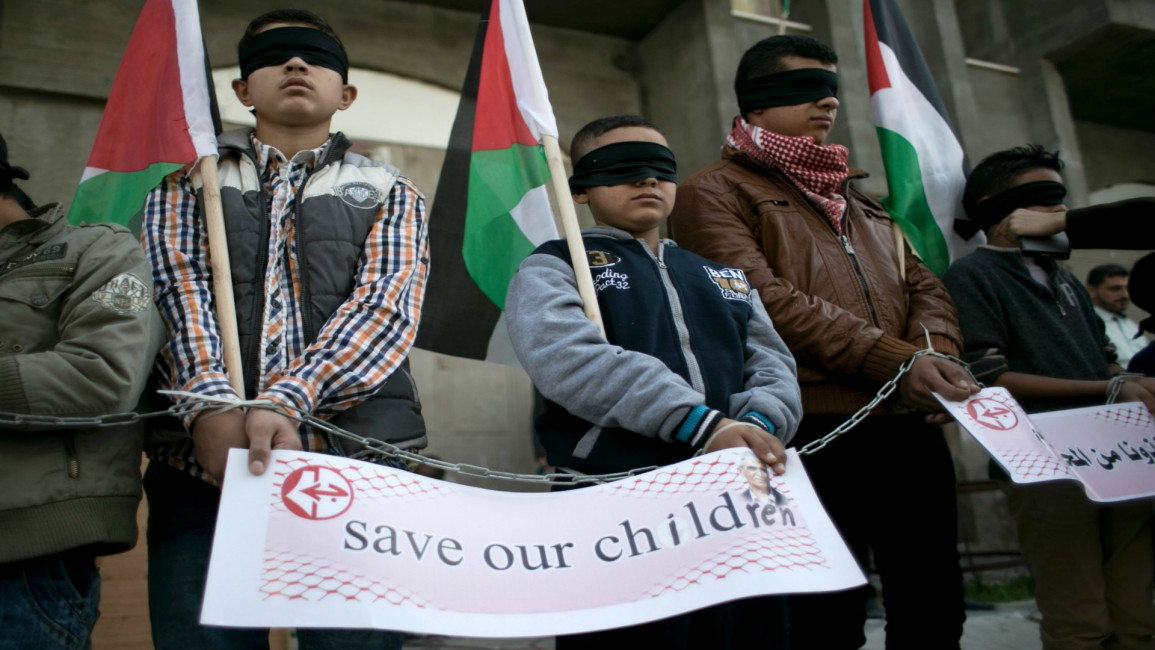
Israel's war on Palestine's younger generation
Israel recently passed a law which allows the imprisonment of Palestinian minors under the age of 12 who are convicted of murder, attempted murder and manslaughter. Without the slightest indication of perceiving an anomaly, given the obvious Israeli colonial incitement against Palestinians, the law was deemed as "borne out of necessity" by Likud member Anat Berko, who also proposed the bill.
Berko also availed himself of the opportunity to manipulate the concepts of protection and society. "A society is allowed to protect itself… Perhaps this law will also do something to protect these children from being used to slaughter people."
It has been stated that since the beginning of the Jerusalem Intifada, 2,320 Palestinian minors have been arrested by Israel, with 400 being detained in Israeli prisons. The statistics have been regularly used to portray human rights violations, however scant attention has been given to the dynamics behind the incessant targeting of Palestinian minors.
Berko's fabricated justification is multifaceted. It refuses to discuss the violence of a settler-colonial society and expounds the concept of violence upon the colonised in order to justify further discriminatory legislation. Contrary to Berko's claims, the law does not seek to protect Israeli society, much less Palestinian minors.
It is beneficial to Israel to allow a shard of purported intentional vulnerability in order to claim security concerns in the name of its complicit settler society. The ramifications for Palestinians, however, are far more entrenched than the gross violations which minors encounter in Israeli jails.
Targeting Palestinian minors
Operation Protective Edge was also replete with indiscriminate bombing leading to the maiming and killing of Palestinian children. The murder of the Bakr children as they played on a beach in Gaza was widely disseminated, symbolising an example of Israel's impunity. Indeed the Israeli military absolved itself of the crime a year later, by declaring the children were "in a compound belonging to Hamas's Naval Police and Naval Force (including naval commandos) and which was utilised exclusively by militants."
Israel's targeting of schools and universities during the 2014 aggression on Gaza clearly exhibited the intention to destroy the foundations of future generations of Palestinians. Education is an area where Palestinians have shown excellence and competence.
 |
Scant attention has been given to the dynamics behind the incessant targeting of Palestinian minors |  |
Targeting educational premises was Israel's overt way of depriving young Palestinians of personal and social development thus ensuring a full cycle of oppression in terms of destruction and damage to buildings, educational material and students themselves.
The Jerusalem Intifada instigated more precision with regards to targeting Palestinian minors. While the 2014 aggression on Gaza provided Israel with a veneer for the documented human rights violations, the Jerusalem Intifada showed Israel's precision targeting through extrajudicial killings of Palestinian minors and further repressive legislation, conveniently approved during the initial settler incitement against Palestinians at al-Aqsa.
The targeting of Palestinian minors in terms of crude violence and legislation should also be perceived as an assault on Palestinian memory narratives.
Thwarting coordinated resistance
If anything is to be gleaned from the Jerusalem Intifada and Israel's subsequent violations, it is the fact that the post-Oslo generation have exhibited differences to their predecessors, in expressing resistance to Israeli colonial violence.
The Jerusalem Intifada is proof of both strengths and weaknesses in Palestinian society, which in turn has revealed differences also in terms of vulnerability. The diplomatic negotiations leading to the Oslo Accords and its aftermath have symbolised a form of surrender that is contrary to historical Palestinian resistance.
 |
Contrary to Berko's claims, the law does not seek to protect Israeli society, much less Palestinian minors |  |
Israel has gone to great efforts to fragment Palestinian memory, aided by the Palestinian leadership. This has resulted in the older generation wallowing in the nostalgia of resistance which is countered by the enforced subjugation advocated for by the Palestinian Authority.
Palestinian memory and narratives are strong, yet countered by the concepts of defeat and collaboration in terms of Israeli colonial expansion and security coordination, which leads to acquiescence.
Palestinian minors, on the other hand, have experienced less in terms of historical memory, and as a result, the most evident traits are anger and frustration at the constantly dwindling opportunities, state and settler violence, PA collaboration with Israel and the reduction of territory.
 |
The targeting of Palestinian minors in terms of crude violence and legislation should also be perceived as an assault on Palestinian memory narratives |  |
It is also clear that Palestinian minors are more reluctant to rely upon resistance factions than their elders. This has resulted in an intifada which lacked organisation and strategy, yet portrayed a clear picture of the diminished role played by resistance factions in contemporary Palestinian society which have traded resistance for solidarity.
Indeed, apart from calls and spurious promises to sustain the intifada, the post-Oslo generation of Palestinians were isolated and their narrative exploited both by Israel and Palestinian leaders.
This exploitation worked well for Israel. Targeting the younger generation, therefore, is not a simple case of visible involvement in Palestinian resistance. It is an act against Palestinian historical memory and Palestinian society.
Israel's latest legislation exploits the rifts in Palestinian society, increasing and preserving Palestinian frustration in order to regale itself with a convenient premise for further colonial violence, while ensuring that the expressed frustration is prevented from becoming coordinated resistance.
Ramona Wadi is an independent researcher, freelance journalist, book reviewer and blogger specialising in the struggle for memory in Chile and Palestine, colonial violence and the manipulation of international law. Follow her on Twitter: @walzerscent
Opinions expressed in this article remain those of the author and do not necessarily represent those of The New Arab, its editorial board or staff.



